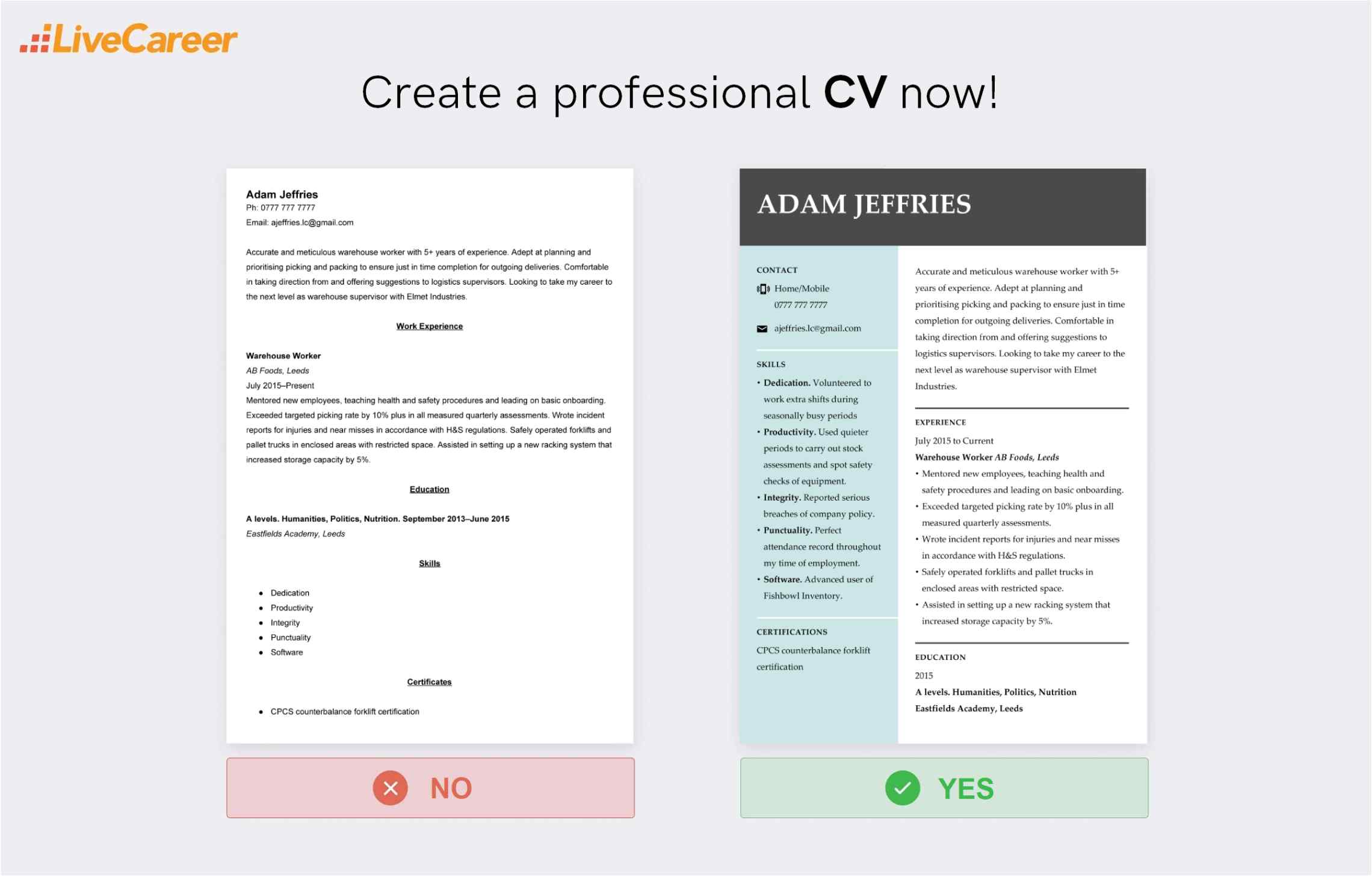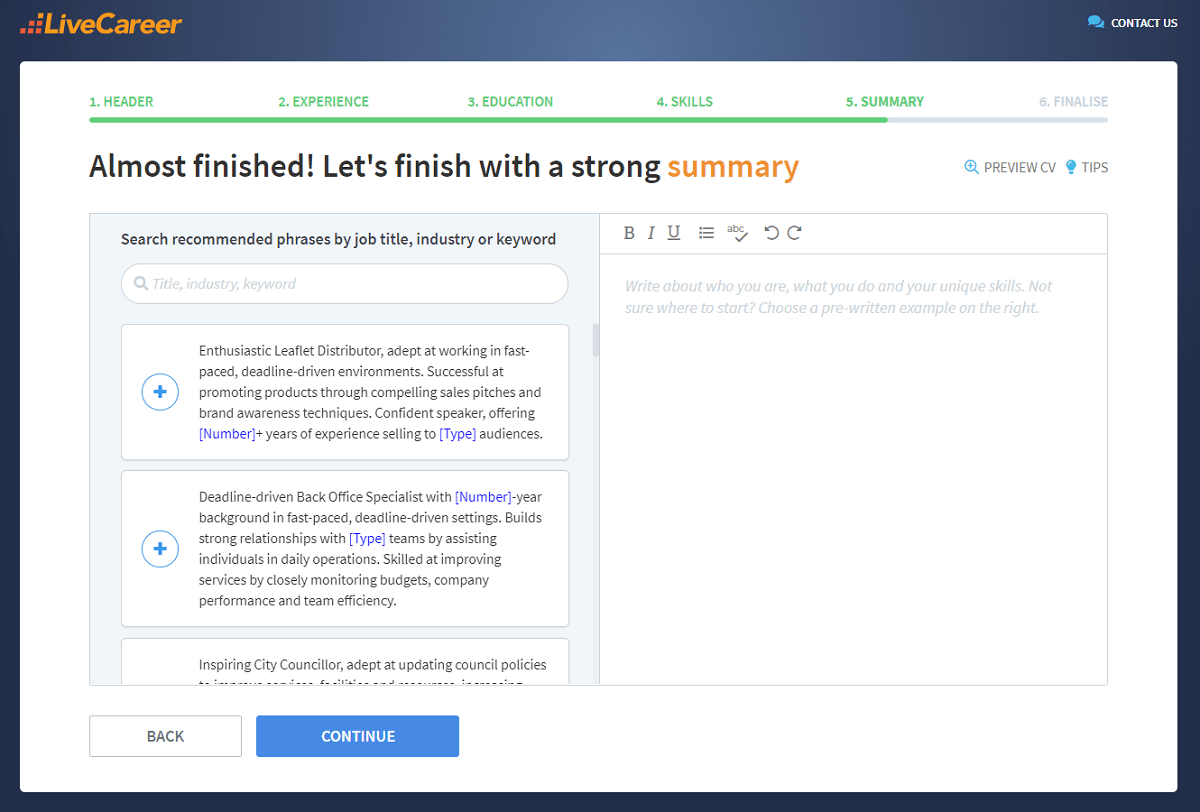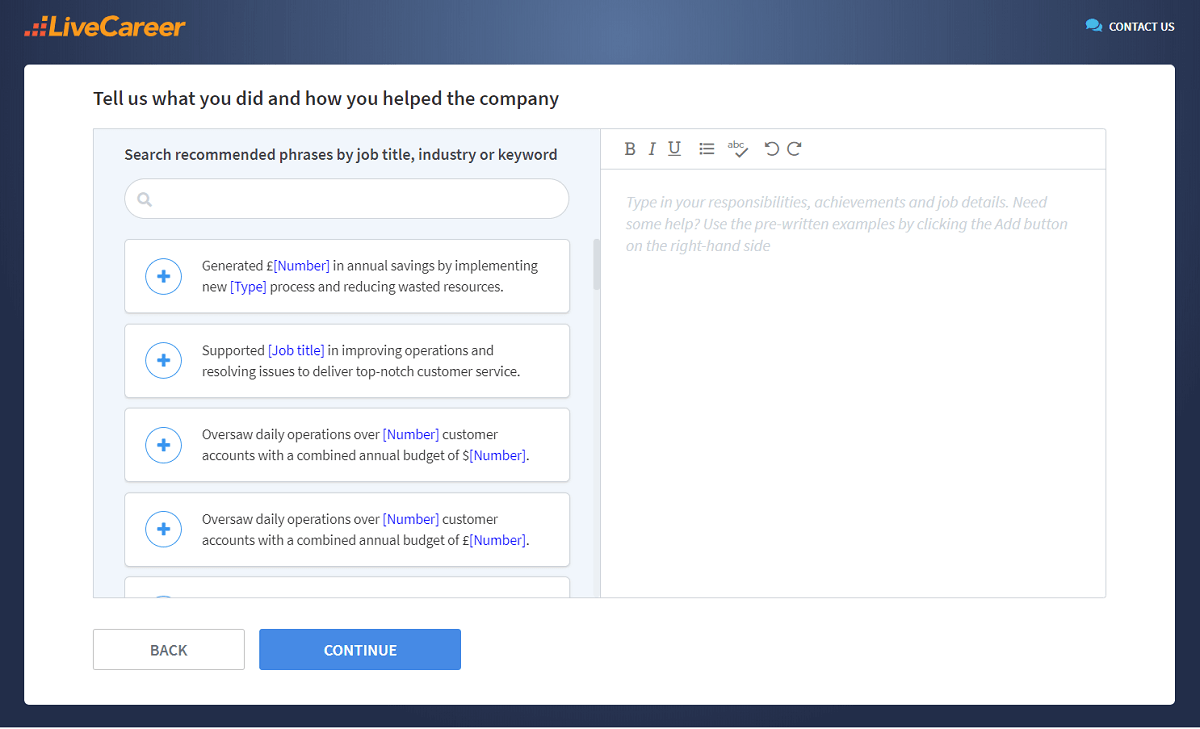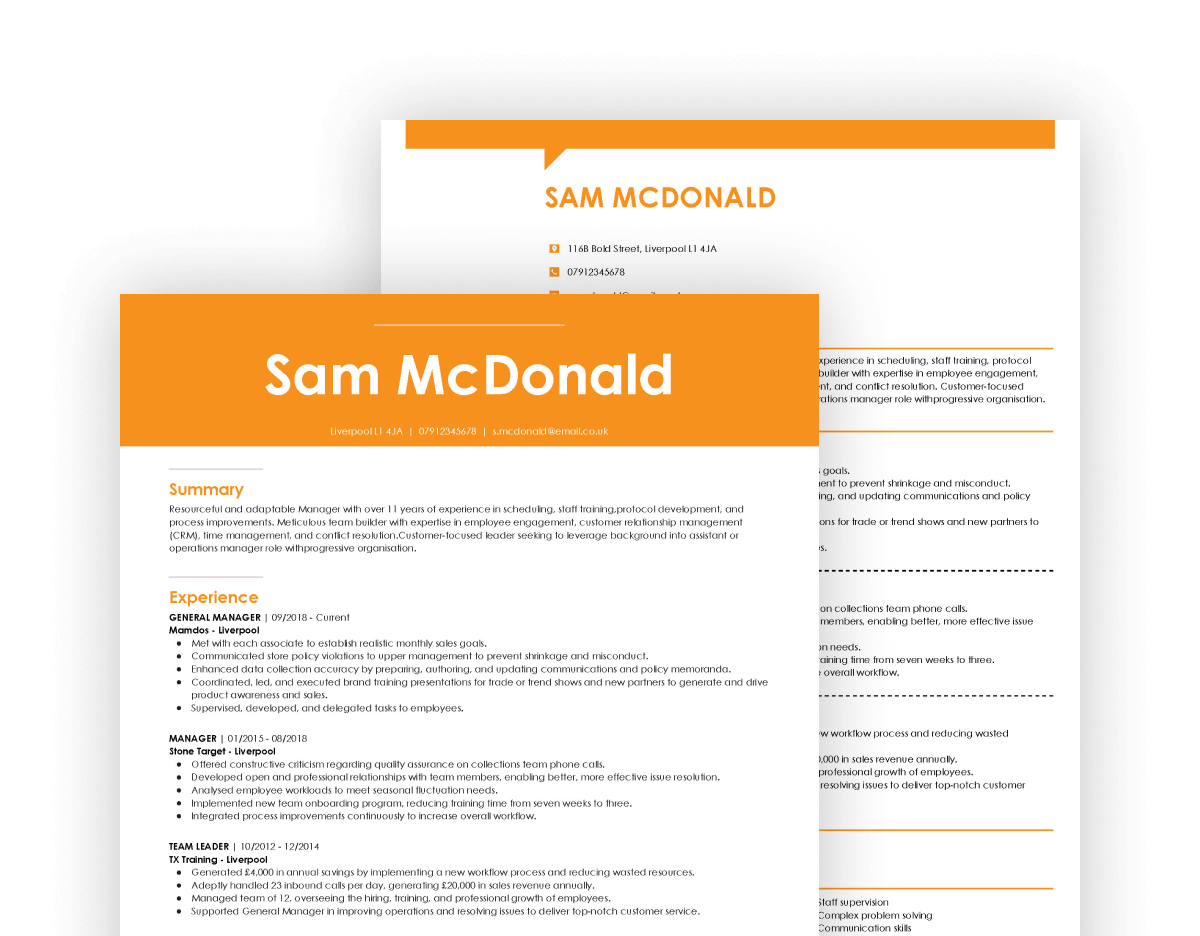How to Write an Electrician CV (Example + Template)
Check the CV for an electrician that will electrify the recruiter. Learn how to make an electrical CV with proven examples, templates, and key tips.
Our customers were hired by:
Transferable skills are abilities that can be used in a wide range of careers. As the name suggests, they can literally be transferred from one job to another and they’re incredibly valuable to employers.
Their versatility means they can be used for any industry and they’re particularly useful for candidates looking to make a career change or targeting entry-level positions.
But that said, transferable skills are essential to nurture no matter where you are in your career. Even if you’re not looking for a new job now, chances are you will be in the future.
In this guide, you’ll learn what transferable skills are and how to include them in your CV. You'll also see some great transferable skills examples. And by the time you’re done, you’ll be able to transfer your talents with confidence.
Create an effective CV in minutes. Choose a professional CV template and fill in every section of your CV in a flash using ready-made content and expert tips.

We created the sample on the right using our builder. See other good CV examples like this one.
Describing skills on a CV? Check these guides, too:
Adam Jeffries
Ph: 0777 777 7777
Email: ajeffries.lc@gmail.com
Accurate and meticulous warehouse worker with 5+ years of experience. Adept at planning and prioritising picking and packing to ensure just in time completion for outgoing deliveries. Comfortable in taking direction from and offering suggestions to logistics supervisors. Looking to take my career to the next level as warehouse supervisor with Elmet Industries.
Work Experience
Warehouse Worker
AB Foods, Leeds
July 2015–Present
Education
A levels. Humanities, Politics, Nutrition. September 2013–June 2015
Eastfields Academy, Leeds
Skills
Certificates
The importance of transferable skills can’t be overstated. They’re the abilities that go to the very heart of your ability to function effectively and productively in the workplace. And although they’re generally more soft skills than the hard skills you gain for specific roles they’re of paramount importance in any job application.
According to government statistics, in the years 2000-2018 around 9% of the workforce changed jobs every year. As I’ve already mentioned, even if you haven’t changed jobs recently, chances are you will in the future. So it’s essential to have a core set of portable skills you can take with you from one job to the next.
There are too many transferable skills examples to list in this guide, so we’ve narrowed them down to the skills that are the most important for the widest range of industries, focusing mainly on soft skills. All of them guaranteed to make a great addition to your CV.
Communication skills and interpersonal skills are truly universal. They consistently top the list of the skills employers most desire. In any situation where you need to collaborate with or have dealings with other people your communication skills come to the fore. Here are some examples of this most universal of transferable skills.
Leadership skills aren’t just for managers. They’re actually another truly universal transferable job skill. Any situation where you need to take initiative and organise other people to work towards a shared goal requires leadership. And it’s a skill that’s in high demand. One study revealed that only 14% of CEOs say they have the leadership talent needed to achieve their business goals.
Time management is another example of a transferable skill that’s essential for every role. The ability to adhere to schedules and plan workflow is a non-negotiable. Here are some examples of how this transferable skill could appear on your CV.
The majority of jobs require you to be able to work well with others. Teamwork is consistently one the top transferable skills employers seek. Here are a few examples to use on your CV.
We’ve just mentioned teamwork, but the ability to work effectively alone is also crucial. These are some skills that are essential to working effectively as an individual.
Every employer wants motivated and hard-working employees and this makes a strong work ethic one of the most valuable transferable skills you can possess. Here are some different examples to use on your CV.
The modern economy is increasingly data-driven and the value of data to the UK economy is already in the billions of pounds and set to rise exponentially in the future. Research and analysis are among the best transferable skills to help companies take advantage of this growth. They’re also key to problem-solving, budgeting and a host of other workplace scenarios.
Computer skills, including IT skills, are among the most transferable and common hard skills. They are in high demand for almost every job. Here are some of the best examples.
Every role has its challenges. Being able to face them and overcome them with effective solutions is essential to being a productive employee. Here are some skills that are crucial to efficient problem solving.
A strong CV summary will convince the recruiter you’re the perfect candidate. Save time and choose a ready-made personal statement written by career experts and adjust it to your needs in the LiveCareer CV builder.

Your transferable skills list needs to be included as a separate section immediately after your CV education. Write it as a bulleted list, containing 5–10 points, and give it the heading ‘Skills.’
But to do it effectively you’ll need to do more than just throw together a list. Here’s how to make sure it has maximum impact.
Firstly, you can’t just randomly choose a list of skills, they have to be targeted to the job you’re applying for. To choose effectively you’ll need to do a little analysis before you write. Refer back to the job advert and take a note of every skill it mentions. Then write a list of every skill that you possess, whether it was gained through work, education or other life experiences.
Then choose transferable skills from your own list that match the requirements mentioned in the advert. If you’re making a career change then these can all be transferable skills. But even candidates applying for a job within the same industry would benefit from including one or two of the major transferable skills. Just adapt your approach to your own circumstances.
And don’t just list your skills, add a brief explanation of each to give them more impact. Here’s an example of a good list of transferable skills.
Transferable skills examples–skills section
Skills
But that’s not the only place to show off transferable skills. For maximum effect you should sprinkle them throughout your CV. Let’s start off with an example from the first section of your CV, your CV profile.
Transferable skills examples–CV profile
Creative marketing assistant with 2 years of experience in social media advertising. Specialist in establishing trusted relationships with clients through attentive collaboration. Looking to contribute my skills to further Sedgeworth’s marketing team’s future success.
That CV summary is sure to make a powerful first impression. It includes top transferable skills like social media, communication and teamwork. Moving on, your work history also offers an ideal opportunity to weave in more transferable skills.
Transferable skills examples–work experience section
Work Experience
Project Manager
Celtrex Software, London
October 2016–Present
That example shows off analytical and time management skills. Two of the most sought after transferable skills. Then we move on to your education section. If you haven’t got much experience, such as if you’re writing a student CV, it’s yet another place to add some transferable skills.
Transferable skills examples–education section
BSc Education, September 2017–June 2020
The University of Manchester
Lastly, you can demonstrate transferable skills in additional sections of your CV that follow after your skills section. A good example is including details of any foreign languages you can speak, as well as relevant hobbies and interests.
Transferable skills examples–additional sections
Languages
If by this point you’re worried your transferable skills aren’t up to scratch, relax, there are lots of options available for you to develop your transferable skills. Here’s what to do.
Take the time to list all of the skills you already possess. And remember skills don’t just come from work. For example, hobbies and interests can help teach vital transferable skills. Team sports is a great way to learn teamwork and leadership.
Ask a manager or a friendly colleague to advise you on what skills you need to improve. Identifying your skills gap is essential to choosing the right training.
Udemy, Coursera, The Open University and edX offer courses in a wide range of subjects. We live in a golden age of training and development. Make use of it.
Many larger employers offer training in a variety of subjects. And as transferable skills are among the most important and fundamental workplace skills, chances are you’ll find something useful on offer.
Take a look at the UK government’s career skills and training portal. Upskilling the workforce is recognised as a crucial factor in growing the national economy. So there are more options than ever before for you to obtain good transferable skills.
Once you’ve undertaken training, put your new found skills into practice. Ask about being assigned work that lets you consolidate your new learning or find projects that will let you practice in your spare time.
If you’re planning a career move you’ll need to find out as much as possible about your new industry of choice. Consider attending careers fairs and conferences to build contacts, and learn which transferable skills to focus on.
Don’t forget to show off your new-found skills in your CV. Take a look at our guide on how to write a CV to find out more.
When you’re applying for that new job you’ll need a cover letter too. Start thinking about how you can use it to showcase your newly developed abilities. Read our guide on how to write a cover letter to get it right.
You don’t have to be a CV writing expert. In the LiveCareer CV builder you’ll find ready-made content for every industry and position, which you can then add with a single click.

Thanks for reading. If you have any questions about CV transferable skills or specifically our list of transferable skills, please ask in the comments section, and I’ll be happy to help.
Our editorial team has reviewed this article for compliance with Livecareer’s editorial guidelines. It’s to ensure that our expert advice and recommendations are consistent across all our career guides and align with current CV and cover letter writing standards and trends. We’re trusted by over 10 million job seekers, supporting them on their way to finding their dream job. Each article is preceded by research and scrutiny to ensure our content responds to current market trends and demand.
About the author
Since 2013, the LiveCareer UK team has shared the best advice to help you advance your career. Experts from our UK editorial team have written more than one hundred guides on how to write the perfect CV or cover letter.
Rate this article:
Transferable skills
Average:

Check the CV for an electrician that will electrify the recruiter. Learn how to make an electrical CV with proven examples, templates, and key tips.
You need solid on-field performance to get signed, but it’s not enough–follow along with our football CV template and score one over your competition!
Forget about generic sales assistant CV. This CV example for sales assistant will teach you how to present your best traits & sales assistant skills.
Our customers were hired by: